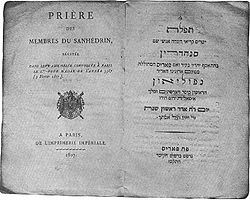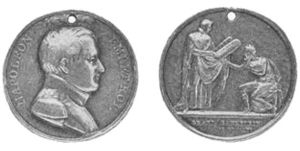- Grand Sanhedrin
-
The Grand Sanhedrin was a Jewish high court convened in Europe by Napoleon I to give legal sanction to the principles expressed by the Assembly of Notables in answer to the twelve questions submitted to it by the government.[1] The name was chosen to imply that the Grand Sanhedrin had the authority of the original Sanhedrin that had been the main legislative and judicial body of the Jewish people in classical and late antiquity.
Contents
Assembly of Notables
An Assembly of Jewish notables was summoned in April 1806 by the Emperor to consider a set of 12 questions. Those who attended were largely from the Bordeaux or Rhine regions (Alsace and Lorraine). They were led by Rabbi David Sinzheim of Strasbourg, who presently became the president of the Sanhedrin.
The questions presented were:
 Cover page to siddur used at the Grand Sanhedrin of Napoleon, 1807.
Cover page to siddur used at the Grand Sanhedrin of Napoleon, 1807.
- Is it lawful for Jews to have more than one wife?
- Is divorce allowed by the Jewish religion? Is divorce valid, although pronounced not by courts of justice but by virtue of laws in contradiction to the French code?
- May a Jewess marry a Christian, or [May] a Jew [marry] a Christian woman? or does Jewish law order that the Jews should only intermarry among themselves?
- In the eyes of Jews are Frenchmen not of the Jewish religion considered as brethren or as strangers?
- What conduct does Jewish law prescribe toward Frenchmen not of the Jewish religion?
- Do the Jews born in France, and treated by the law as French citizens, acknowledge France as their country? Are they bound to defend it? Are they bound to obey the laws and follow the directions of the civil code?
- Who elects the rabbis?
- What kind of police jurisdiction do the rabbis exercise over the Jews? What judicial power do they exercise over them?
- Are the police jurisdiction of the rabbis and the forms of the election regulated by Jewish law, or are they only sanctioned by custom?
- Are there professions from which the Jews are excluded by their law?
- Does Jewish law forbid the Jews to take usury from their brethren?
- Does it forbid, or does it allow, usury in dealings with strangers?
Creation of the Sanhedrin
At one of the meetings of the Notables, Commissioner Comte Louis Matthieu Molé expressed the satisfaction of the emperor with their answers, and announced that the emperor, requiring a pledge of strict adherence to these principles, had resolved to call together a 'great sanhedrin' which should convert the answers into decisions and make them the basis of the future status of the Jews, create a new organization, and condemn all false interpretations of their religious laws. In order that this sanhedrin, reviving the old Sanhedrin of Jerusalem, might be vested with the same sacred character as that time-honored institution, it was to be constituted on a similar pattern: it was to be composed of seventy-one members—two-thirds of them rabbis and one-third laymen. The Assembly of Notables, which was to continue its sessions, was to elect the members of the sanhedrin, and notify the several communities of Europe of its meeting, "that they may send deputies worthy of communicating with you and able to give to the government additional information." The Assembly of Notables was to appoint also a committee of nine, whose duty it would be to prepare the work of the sanhedrin and devise a plan for the future organization of the Jews in France and Italy (see Consistoire).
On October 6, 1806, the Assembly of Notables issued a proclamation to all the Jewish communities of Europe, inviting them to send delegates to the sanhedrin, to convene on October 20. This proclamation, written in Hebrew, French, German, and Italian, speaks in extravagant terms of the importance of this revived institution and of the greatness of its imperial protector. While the action of Napoleon aroused in many Jews of Germany the hope that, influenced by it, their governments also would grant them the rights of citizenship, others looked upon it as a political contrivance. When in the war against Prussia (1806-7) the emperor invaded Poland and the Jews rendered great services to his army, he remarked, laughing, "The sanhedrin is at least useful to me."[citation needed] David Friedländer and his friends in Berlin described it as a spectacle that Napoleon offered to the Parisians.
 Medallion struck by the Paris mint in commemoration of the Grand Sanhedrin.
Medallion struck by the Paris mint in commemoration of the Grand Sanhedrin.
The opening of the sanhedrin was delayed until Feb. 9, 1807, four days after the adjournment of the Assembly of Notables. Its seventy-one members included the rabbis sitting in the Assembly, to whom were added twenty-nine other rabbis and twenty-five laymen. Its presiding officers, appointed by the minister of the interior, were: Joseph David Sinzheim, rabbi of Strasbourg (president); Joshua Benzion Segre, rabbi, and member of the municipal council of Vercelli (first vice-president); Abraham de Cologna, rabbi of Mantua (second vice-president). After a solemn religious service in the synagogue, the members assembled in the Hôtel de Ville, in a hall specially prepared for them. Following the ancient custom, they took their seats in a semicircle, according to age, on both sides of the presiding officers, the laymen behind the rabbis. They were attired in black garments, with silk capes and three-cornered hats. The sittings were public, and many visitors were present. The first meeting was opened with a Hebrew prayer written by David Sinzheim; after the address of the president and of Abraham Furtado, chairman of the Assembly of Notables, it was adjourned. At the second sitting, Feb. 12, 1807, deputies Asser, Lemon, and Litwack, of the newly constituted Amsterdam Reform congregation Adat Jeshurun, addressed the sanhedrin, Litwack in Hebrew, the others in French, expressing their entire approval of the Assembly and promising their hearty support. But the deputies were greatly disappointed when the president, after having answered them in Hebrew, invited them to be silent listeners instead of taking part in the debates as the proclamation of the Notables had caused them to expect. Addresses from congregations in France, Italy, and the Rhenish Confederation, especially from Neuwied and Dresden, were also presented.
Sessions of the Sanhedrin
In the sittings of Feb. 16, 19, 23, 26, and March 2, the sanhedrin voted without discussion on the replies of the Assembly of Notables, and passed them as laws. At the eighth meeting, on March 9, Hildesheimer, deputy from Frankfurt-am-Main, and Asser of Amsterdam delivered addresses, to which the president responded in Hebrew expressing great hopes for the future. After having received the thanks of the members, he closed the sanhedrin. The Notables convened again on March 25, prepared an official report, and presented it on April 6, 1807; then the imperial commissioners declared the dissolution of the Assembly of Notables.
The decisions of the sanhedrin, formulated in nine articles and drawn up in French and Hebrew, were as follows:
- that, in conformity with the decree of R. Gershom ben Judah, polygamy is forbidden to the Israelites;
- That divorce by the Jewish law is valid only after previous decision of the civil authorities;
- That the religious act of marriage must be preceded by a civil contract;
- That marriages contracted between Israelites and Christians are binding, although they can not be celebrated with religious forms;
- That every Israelite is religiously bound to consider his non-Jewish fellow citizens as brothers, and to aid, protect, and love them as though they were coreligionists;
- That the Israelite is required to consider the land of his birth or adoption as his fatherland, and shall love and defend it when called upon;
- That Judaism does not forbid any kind of handicraft or occupation;
- That it is commendable for Israelites to engage in agriculture, manual labor, and the arts, as their ancestors in Palestine were wont to do;
- That, finally, Israelites are forbidden to exact usury from Jew or Christian.
In the introduction to these resolutions the sanhedrin declared that, by virtue of the right conferred upon it by ancient custom and law, it constituted, like the ancient Sanhedrin, a legal assembly vested with the power of passing ordinances in order to promote the welfare of Israel and inculcate obedience to the laws of the state. These resolutions formed the basis of all subsequent laws and regulations of the French government in regard to the religious affairs of the Jews, although Napoleon, in spite of the declarations, issued a decree on March 17, 1808, restricting the Jews' legal rights. The plan of organization prepared by the committee of nine, having for its object the creation of consistories, was not submitted to the Sanhedrin, but was promulgated by Napoleon's decree of March 17, 1808.
See also
- Napoleon and the Jews
- Rabbinical Conference of Brunswick
References
M.Graetz, tr. J. M. Todd, The Jews in Nineteenth-Century France, Stanford, CA, 1996.
Notes
- ^ Jew. Encyc. v. 468, s.v. France
External links
This article incorporates text from the 1901–1906 Jewish Encyclopedia, a publication now in the public domain.Categories:- Jewish courts and civil law
- Jewish French history
- Jewish political status
- Judaism in France
Wikimedia Foundation. 2010.
